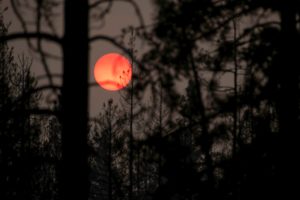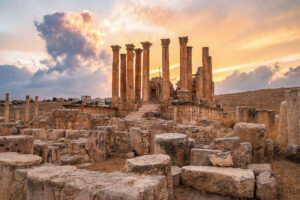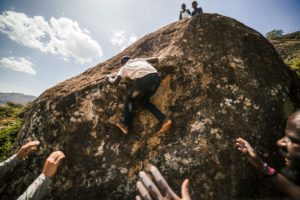Support Hidden Compass
Our articles are crafted by humans (not generative AI). Support Team Human with a contribution!
“You’re going?” the man said, his calloused fingertips fussing with the one remaining button on his ragged shirt. I hadn’t noticed him until he was upon us, his heavy eyes casting a look of disbelief — first over me and my companions, then our limp, 10-foot inflatable dinghy.
He was weathered even by the standards of the Brazilian Sertão, an arid scrubland where the relentless sun wizens everyone beyond their years. His shirt fell open to expose a large, raised scar on his breastbone. The rubbery knob revealed him as a remeiro, one of the boatmen who once poled their way along the river in wooden dugout canoes. When fresh, their gaping, ovular wounds — the result of setting barge poles hard against their chests to fight the strong currents — were sealed with boiling tallow. Now, they are insignias of an obsolete era.
“Be careful,” said the man. “The water, she has no hair.”
I ignored him. Too dazed by the midday heat, and too focused on the map in my hands, I barely registered his words, much less the paradoxical meaning behind them. The voice to which I paid heed, the one cajoling me to stay the course, drowned out most other sounds. The remeiro shuffled off, to the shade of a nearby cashew tree.
My eyes were fixed on the hair-like sweep of the São Francisco River. In its graceful arc through Brazil, the river flows from the Canastra Mountains of Minas Gerais, through the highlands of the interior, and into the Nordeste. This parched scrubland was the first Brazilian land settled by Europeans, and the São Francisco provided the new arrivals — as it had Indigenous peoples such as the Kaxagó, Xocó, and Truká peoples before them — a means of transport and survival. As Brazil became further colonized, it was the São Francisco, more than the Amazon, that threaded the country together, its roughly 1,800 miles eventually supplying the lifeblood for more than 18 million people.
With my finger, I’d followed that veinous line countless times. In 1867, British explorer Richard Francis Burton canoed the São Francisco. I’d read his account, The Highlands of Brazil, like a document that could be traced, replicated, re-done. Along the river’s final 440-mile rush from Juazeiro to the Atlantic, Burton warned of “a thousand perils,” as the gushing river strips the Earth, leaving her “giant skeleton bare.”
Burton’s tales, and others like them, had driven my adolescent self to dream of grandeur — really, to expect it.
His promise of peril rose up in me as much a challenge as an invitation: a place to prove myself. And so there, on the banks of Juazeiro, my two companions and I cast away without looking back — our thoughts and minds already miles beyond the remeiro’s prescient words.
~~
More than a century and a half earlier, Burton ordered his crew into rapid after rapid of the São Francisco. I can see his foot on the boat’s bowhead, his mad eyes gleaming. “Head on, we dashed at the rocks … and more than once we prepared for the shock,” he wrote of running over the river’s Cachoeira do Fura-olho, the Gouged-Eye Rapids.
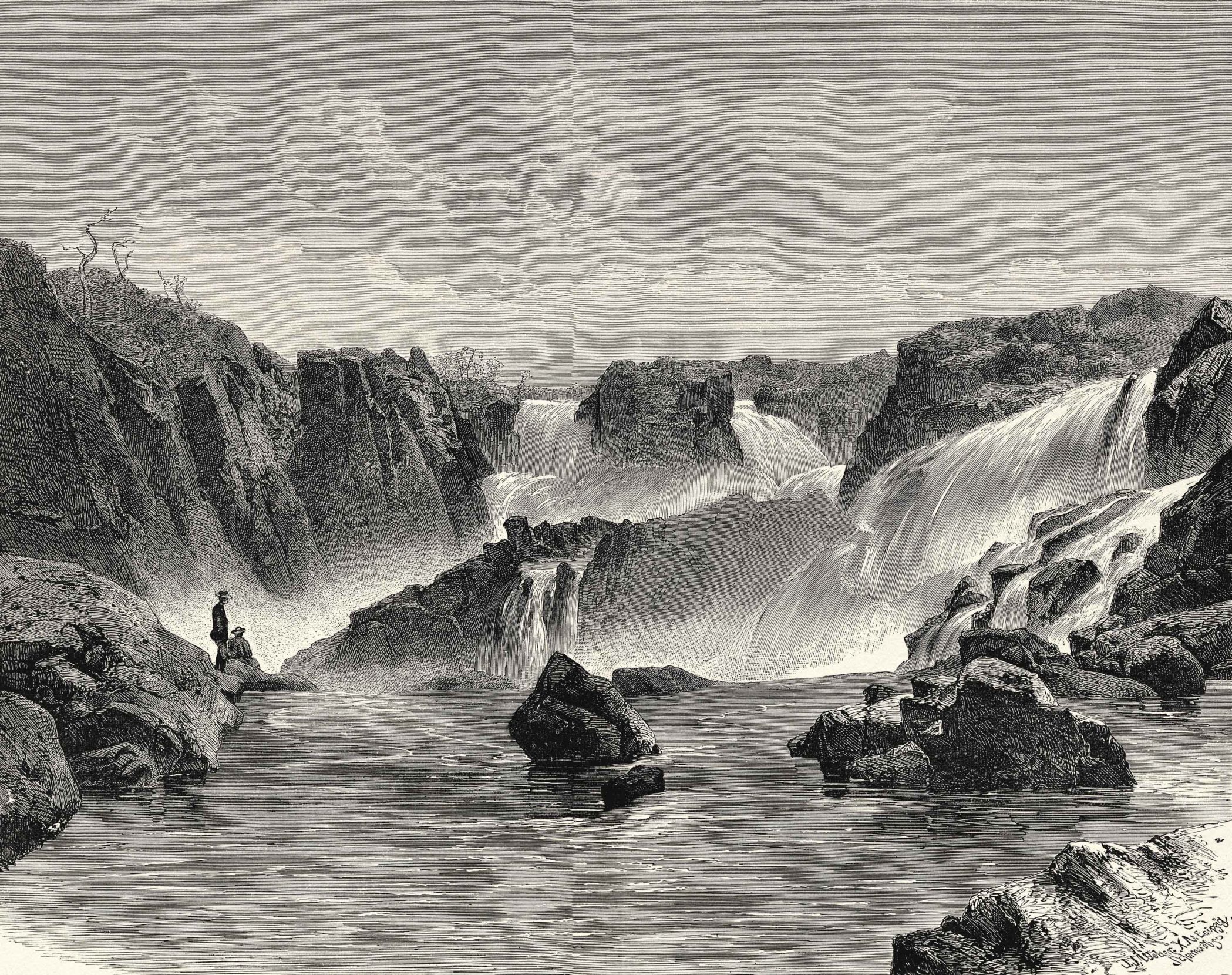
An engraved illustration from the 19th century depicts the force of Brazil’s São Francisco River at the Paulo Afonso Falls, where a network of hydroelectric dams now controls the waterway’s flow. Photo: Old Books Images/Alamy.
The Eliza, his giant catamaran of three canoes, known as an ajôjo, surged in the fast-rushing falls between rocks, taking on billows of foaming water. The river — here pulling, there pushing — carried the party downstream. With Burton barking orders all the while, the Eliza came again and again within a hair’s breadth of being dashed to pieces. On paper, he surmised that he had come so close to death, he had touched it “on either side.”
~~
In my mind, I’d endured those same rapids and waterfalls, saw myself crashing over them in turn, struggling to hold myself aboard as the water sluiced about me. But although the river connected me to Burton through time, nothing else did — our paltry paddling experience paled against Burton’s skilled crew; our flimsy rubber boat was eclipsed by the mighty Eliza. My map and Burton’s writings were often discordant, like two pictures of the same scene taken at different angles, overlaid but dissimilar. I felt if I could get the pictures to match, somewhere a key would turn, and I would move forward.
By the time he reached Brazil, Burton was no stranger to grandiose exploration. He had already snuck into the holy cities of Mecca and Harar, had trekked into the depths of Africa to search for the source of the Nile, and had set off to discover (for Europe) Lake Tanganyika. He took physical travail in stride: To prepare for his subversive Mecca journey, he was rumored to have circumcised himself in his 30s, and his face bore a scar from a Somali warrior’s spear thrust through his skull.
Burton’s tales, and others like them, had driven my adolescent self to dream of grandeur — really, to expect it. His world, while straddling the line between the impossible and the practical, always seemed attainable because the tenets upon which it rested — courage, derring-do, gumption — could be cultivated in anyone. His misadventures only magnified his aura, and each time he risked his life against the world, he emerged reborn.
His expedition through Brazil remains one of his under-appreciated journeys, ripe for a neophyte writer to pluck. Trailing on his heels down the São Francisco felt like a way to secure my own legacy.
~~
Our first night, we made camp on a secluded island in the river. We roasted our meat on a fire, drank beer, and slept sound under a star-smeared darkness. Before us stretched time and opportunity.
We awoke before dawn and slipped our boat into the river while it was still dark. But the morning’s forward momentum soon capitulated to the lassitude of the river. Once the day began in earnest, the sun flattened us against the water, turned our skin the color of rust. The air, once sweet, became tainted with our sweat, a sourness we blinked from our eyes.
Our optimism met miles-long stretches of flat water. Paddling quickly turned desultory as we gained mere inches, the water refusing to yield to our enthusiasm.
~~
The São Francisco of Burton’s time was ever-changing — in some places as narrow as the raft itself, in others a kilometer wide. The Eliza’s battles against the river’s flow were like the testing of one iron will against another. Indeed, for Burton the waters showed a “relentless aspect when some obstacle of exceptional importance would bar its mighty path.”
After a day of cantilevering over rapids, his crew would take respite in finding a pool of calm water. There, his crew enjoyed feasts of fish and fruit, the river offering its bounty by the bucketful. A mighty river, then, and one of plenty. Exclaimed Burton, “Lands that will fructify every manner of plant and grain cast into their bosom, shoals of fish to feed the poor, a wealth of precious stones and ores, a channel easily connecting with the outer world!”
~~
With visions of roasted piranha and pacú, we cast a fishing line, but hooked only shreds of plastic, sodden pieces of Styrofoam, used condoms. We met no roaring rapids, no resistance to throw our strength against; there was nothing but the quiet cruelty of a becalmed water. Burton’s spritely river had languished.
On a blustery day, the wind bore upriver, rippling the strip of gray-green silk on which we floated, and held us in place against the current. Caught between equal forces, spinning slowly in place, I felt as though I was floating through some lost part of myself.
~~
I can see his foot on the boat’s bowhead, his mad eyes gleaming.
A man of vision, Burton had confidently declared the São Francisco a “glorious stream of the future,” whose banks contained “all the elements of prosperity required by an empire.” While he was speaking of the river’s then abundant wood, silver, gold, and other resources, his predictions would manifest themselves most palpably in hydroelectric dam complexes.
Though the river provided massive hydroelectric profits, each new dam constricted and altered the waterway, swelling the river into massive lakes that wend like curvilinear dragons into the countryside. Under those reservoirs lie numerous drowned villages. Since the river’s first dam at Paulo Afonso began operations in 1949, no fewer than 59,000 people have been displaced. Those who remain must chisel a living from the dry sertão soil. They face a river progressively degraded by decades of drought, pollution, and the constant draw for irrigation.
From the depression of the river, the green verge along the bank might’ve been taken for the fringe of a dense jungle of palms, mango, and cashew. It was pure illusion. The water slaked the riverside mangroves and farms, but beyond the verdant edge lay nothing but caatinga, a stretch of dry and withered trees, nettles, and shrubs, all stemming from the earth like upended, petrified lightning bolts.
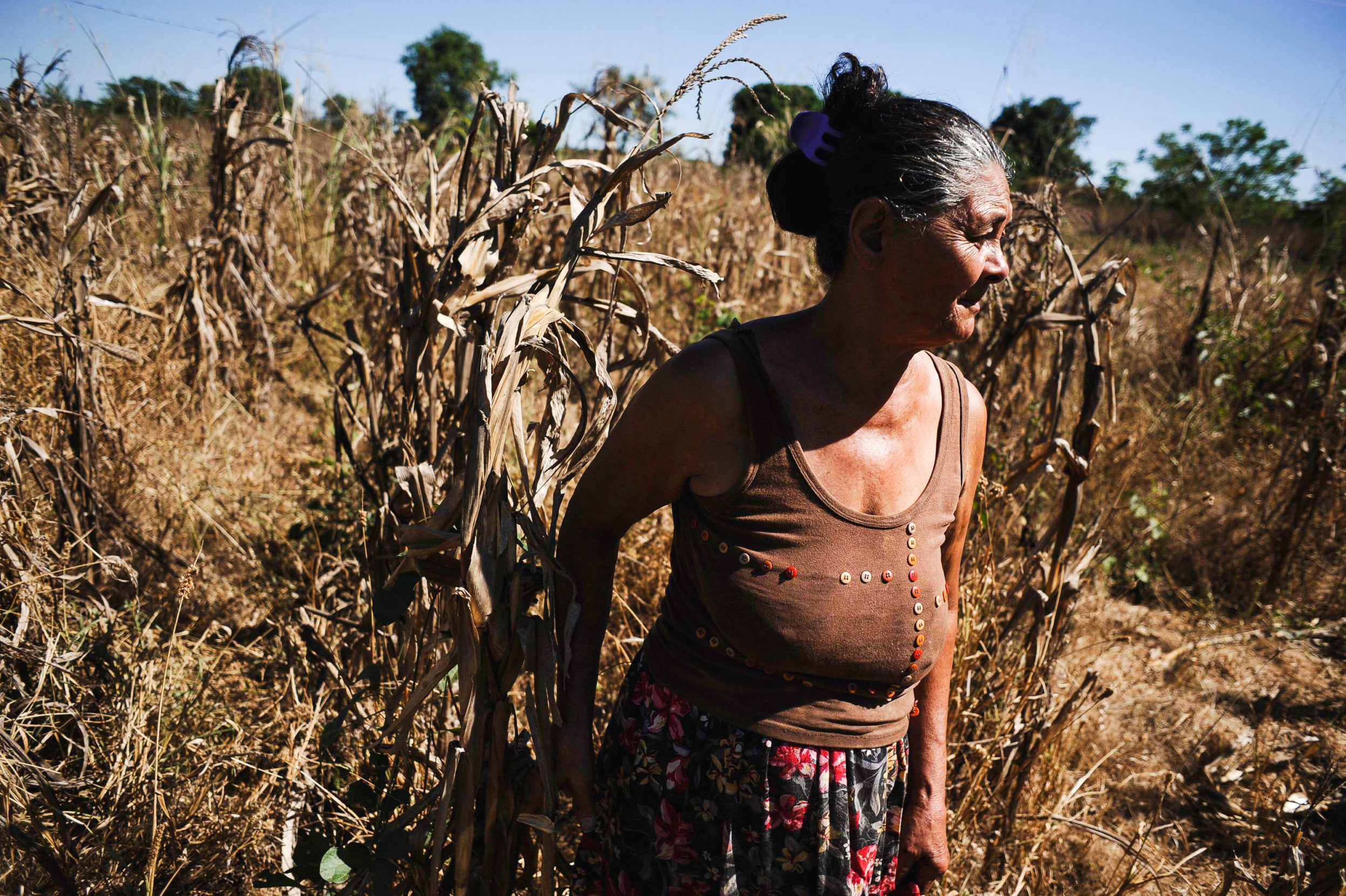
Brazilian farmer Maria Benedita stands among her dried-up corn stalks in 2014. Persistent drought along the diminished São Francisco River threatens the livelihood of local farmers and fishers. Photo: Reuters/Alamy.
Then, as now, the sertão is a land of sinew and thin, bowstring muscles. Working their riverside fields, whether with mattocks or tractors, the sertanejos moved about this “white forest” (so named by the Tupi people who once inhabited the area), raising their living from the land as we glided past. On the hardscrabble soil, where little grows without constant care, reedy men and women cooked under a scorching sun. The color of the russet soil, they were camouflaged against the hinterland.
Burton’s encounters with sertanejos were typically detached. Arriving to a new town, Burton would be whisked away by the ruling colonist to be feted with food and drink.
Our meetings with the sertanejos were likewise quick and shallow — directions, food, water. Under the toxic heat, the cultural miasma along the river melted together, and dripped away. We were an amorphous solid afloat a depthless, motionless void.
~~
Each night we made camp at the river’s edge, eating cashew fruit and sand-blown pumpkin cooked over a fire, as the rich blue of the sky slipped imperceptibly into darkness. One night, the voices of two men carried across the inky water as clearly as if they were standing beside me. A light flashed out from the darkness of the opposite bank. Its beam, too weak to reach us, dissipated over the lazy flow of the river’s breadth. The voices called out, but I remained silent, scared to commune with the living. My time — my journey — was for the dead.
In time the wind rose, sweeping away the voices and filling the air with an invisible veil of sand.
~~
Weeks into our journey, we were dismayed at our lack of progress. The river no longer felt like a stray hair laid upon the land, but rather a scar cut through it, severing the hinterland like a suture mark, its parched tributaries drawing the two riverbanks together like desiccated stitches.
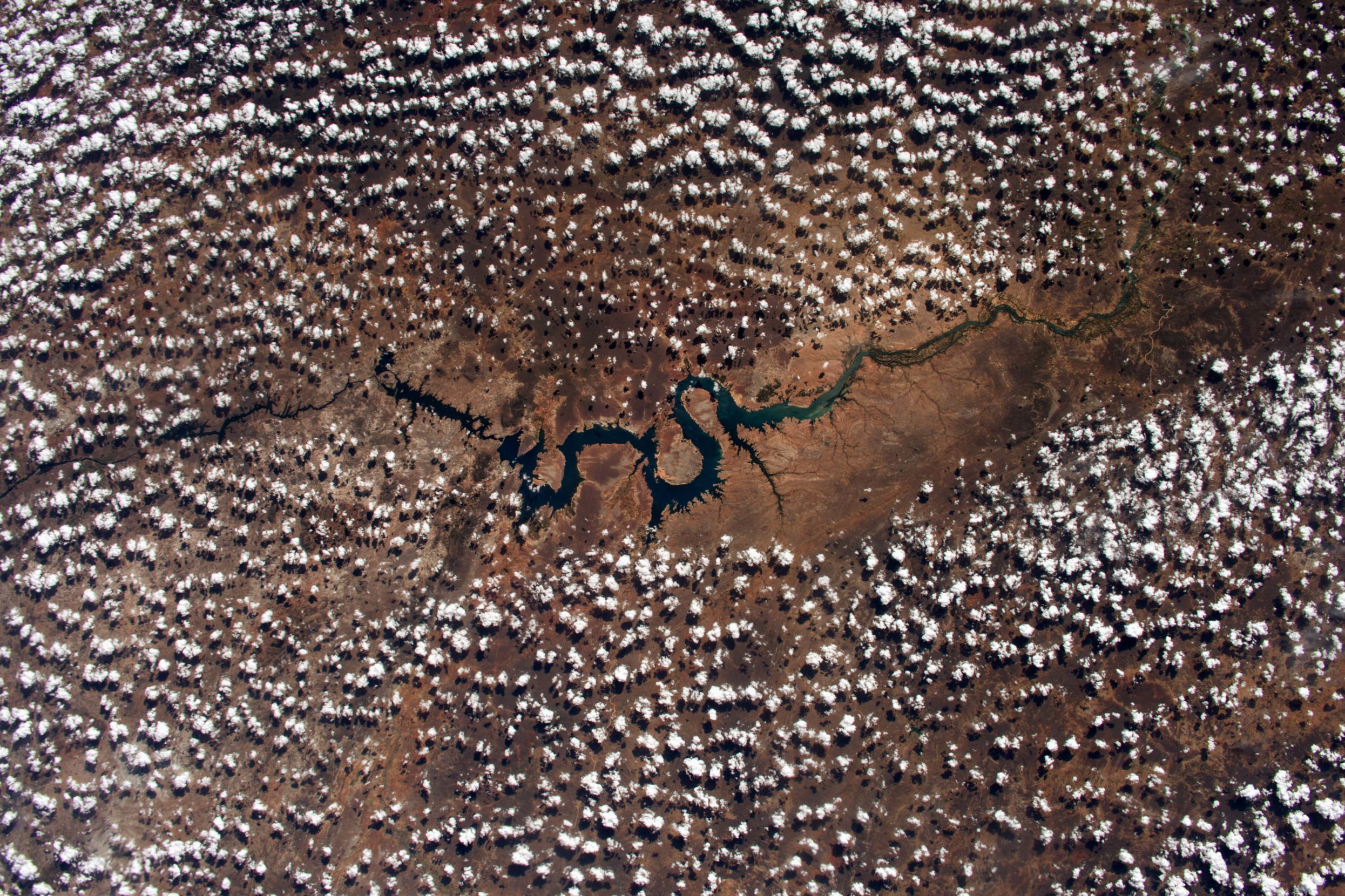
As captured from space, the São Francisco River carves out the shape of a dragon as it wends through the arid hinterland of Brazil. Photo: ESA/NASA.
Our time was not infinite, and I began to feel Burton’s intensity creep over me. I pushed us to paddle longer and harder. Burton became my deranged other self as we spent 14-hour days paddling, stopping only to raid riverside farms for coconuts, which we trepanned and devoured on the move.
Relations on the boat soured. I went hours, then days, without speaking, the silence cut only by the incessant slicing of the paddles, and the jagged cough of irrigation pumps sucking the river up into plantations. When I spoke, it was in the clipped manner of fatigue and frustration at my companions’ errors or idleness.
I felt myself being pulled down, into the silent depths.
~~
One day, we drifted past a sprawling mango plantation, its fruits bound for Canada and Northern Europe. For a mile, the large, leafy trees bordered the river. The heart-shaped fruit, green and golden, dangled out of reach behind a chain-link fence. Burton’s travels laid the cornerstone for this foundation of export. Today, most of the sertão’s bounty — iron ore, lumber — is exported. And though the sales bring riches to Brazil as a nation, the sertanejos remain as poor as ever.
“In the presence of such vast and unexploited wealth awaiting the distressed classes of Europe,” Burton wrote of the São Francisco’s natural bounty, “we may exclaim with Goethe, ‘Who says there is nothing for the poor and vile save poverty and crime?’”
Burton is mentioned frequently in Edward Said’s Orientalism, where he’s taken as both a rebel against, and an agent of, authority; his work was a vital part of Europe’s 19th-century fascination with Brazil. Burton’s contributions were detailed descriptions of minerals and diamonds, soil composition, and of flora and fauna — from grapevines to silkworm and black cattle. This compendium of potential resources aided the growth of not only the British empire, but also the burgeoning Brazilian one.
As Said infers, Burton did not seek to engage the world dialectically, but through the procedure of classification and taxonomy to reduce its otherness to the conformity of a universal knowledge. Burton’s writing, Said critiques, reads as “chronological and dutifully linear” as a shopping trip.
And how was my own exclamation to be different? Had I not also come to extract something, to use the São Francisco to my benefit? Were my thoughts and observations the bounty I would export for the entertainment of some Western audience?
~~
Progressively, we were beset by failures that were small, and by themselves not ruinous. A fishhook caught the side of the boat, leaving a hole that left a trail of bubbles in our wake and required constant repatching. We lost our way in a labyrinth of small islands and spent a day backtracking.
Then, one day, the air thickened and clouded without warning. The flash thunderstorm caught us far from shore. Drenched by the lashing rain, we made for cover when a lightning bolt cracked into the water only a few yards from the boat. The air hummed with electricity, fraying our already wretched nerves.
In that moment, it was clear what I hoped to accomplish was beyond us. In three weeks of paddling, we had covered only 150 miles of a planned 440.
~~
Ten miles upstream of Belem do São Francisco, we slipped into a small, closely forested tributary. A fisherman on the riverbank had warned us against taking it, but the shortcut would save us hours of paddling — of this I was certain.
Too late, we realized our mistake. Soon a mire of lilies, reeds, and low-hanging trees enveloped us. Thorned in a dozen places, our boat began to lose air. Thinking I could make better time alone, I separated from my companions. They took to land, while I slogged the boat onward, alone.
My time — my journey — was for the dead.
~~
Sucking in the rancid smell of stale water and rotting vegetation, I hacked and clawed at the tangle of jungle, pulling the boat forward, hand over vine, until the river abutted an open, flat stretch of green too solid for a paddle to penetrate. Taking it for land, I stepped out onto the greensward, and broke through into the dark swamp below.
My heavy clothes and boots dragged me down into the dark water. I stretched my legs, straining my feet for something to push against, but there was no bottom I could reach. Thrusting to the surface, I grasped at the boat, but managed only to push it out of reach. I floundered amidst the duckweed and lily pads, reaching out for something to grip, but all gave way when I laid my hands upon it.
Thick, greasy plant roots wound themselves around my legs as I kicked to stay afloat. The smell of the water, the scent of rot, began to overwhelm me. I felt myself being pulled down, into the silent depths.
Really, though, my descent had begun long before — with my repeated disregard of the people in this place. Each day we had drifted by the sertanejos, their backs bent as they weeded their plots, hauled their fishnets, herded their cattle. From the outset, I’d forsaken their knowledge and guidance for the words and goals of a dead Victorian. What had I been doing but reaffirming old exploitation — one self-absorbed European trailing after another? There was no denying I had exchanged the old men who lived along the river for one who had, centuries ago, only briefly passed through, commenting without knowing.
~~
I made one more attempt at the boat, and with a violent burst of energy, hauled myself up and over the side. I lay, wet and choking, within the rubber vessel, bounded by the ends of the boat, which rose around me like a Venus flytrap enclosing an insect.
Rallying, I chopped and dragged the boat to the riverside. Ashore, I wandered through the thick undergrowth. I called for my companions, but the sound caught and died, echoless and flat, in the foliage. Night began to fall, and with it a sinking desperation. The world is a small place until you find yourself lost in it. Then, even a step in any direction feels a long distance. I scoured the riverside, moving undecidedly back and forth through the jungle, cutting branches and vines, and calling out, until, by luck, our party came together and embraced.
Looking at our punctured boat, at our sodden and miserable selves, I conceded defeat. For the first time in weeks, I left the river.
~~
We had run aground near a farm, where an elderly brother and sister quickly found us wavering at the riverside. They led us to a farmhouse and a room with cool, white sheets. The woman, who insisted we call her Avó, Grandma, brought us bottles of beer chilled to their freezing point, and fresh, firm fruit from her umbuzeiro tree, shiny green and as large as apples.
“The sacred tree of the sertão,” she said, smiling. The old man, an aged vaquiero with one eye, tutted at our punctured boat, then slaughtered a goat and served us the spinal column, which he assured us was the choicest cut on the sertão.
We stayed one day, then another, and another. Away from the river, I felt Burton drain away from me. My eagerness to trot behind him had made me bullish and rude. Thinking over the opportunities to connect and enjoy ourselves that I had lost us, I felt sick. I took to prowling the farm in frustration, where, squatting amidst bleached goat-bones, I paged through my blank writing notebook.
~~
The vaquiero beckoned me into the small hut in which he lived. The hut was furnished simply: a cot, a wooden table, and a large blue barrel of the kind that my grandmother had used to catch rain from her eavestroughs. On the wall hung a devotional of the Virgin, and, above the barrel, a small mirror.
The man spoke, but I did not understand his jargon-heavy speech. From the barrel he pulled out a bottle of cachaça, a liquor distilled from sugar cane. He pointed it towards me, his big hand directing it like a pistol. I took a swig and grimaced at its harsh acidity. We passed the bottle back and forth until the rawness in my throat begged me to stop. At his urging, I took a final, appeasing sip. With the cachaça to my lips, my drinking partner gripped the bottle and held it tightly, forcing me to polish off the liquor in one long, final pull.
“You were lucky on the river,” the man said, releasing me. His words were now slow and deliberate. “The water, she has no hair.”
I gasped, my eyes watering from the harsh spirit. In the mirror above the sink, I could see the man’s hairy nape, his deeply lined neck. He clutched his fist tightly, flexing his wrinkled arm.
“Hold on to each other,” he said. “Because, if you go under, there’s no hair — there is nothing — to grab onto.” He opened his hand to reveal his dark palm white from the pressure of his grip. “You’ll just disappear.”
I pushed outside, into the blazing heat, where I saw my companions beside our damaged vessel, waiting to take me onward.
~~
Too late, I learned this was not Burton’s story, nor mine, but, perhaps, that of Avó and her brother — their true names lost to my cultural tinnitus.
“The power to narrate, or to block other narratives from forming and emerging, is very important to culture and imperialism, and constitutes one of the main connections between them,” Said also wrote.
Under the toxic heat, the cultural miasma along the river melted together, and dripped away.
I had attempted to disappear into Burton without bothering to really listen to him, either. He was, after all, the man who saw truth as a shattered mirror, each shard taken up by an individual reflecting an image of their world alone. The greatest mistake, he said, was thinking each piece embodied the whole.
I had picked up his imperialist torch and plodded past the light all around me, having been sucked into the hell of thinking of exploration as merely a means to look and take. Accepting that mindset had been the true danger, the one that nearly drowned me.
Too late, I realized the river has no hair. I missed my chance to hear my hosts’ stories; out of step with time, I’d mistaken the shallows of spectacle for the depths of perception.
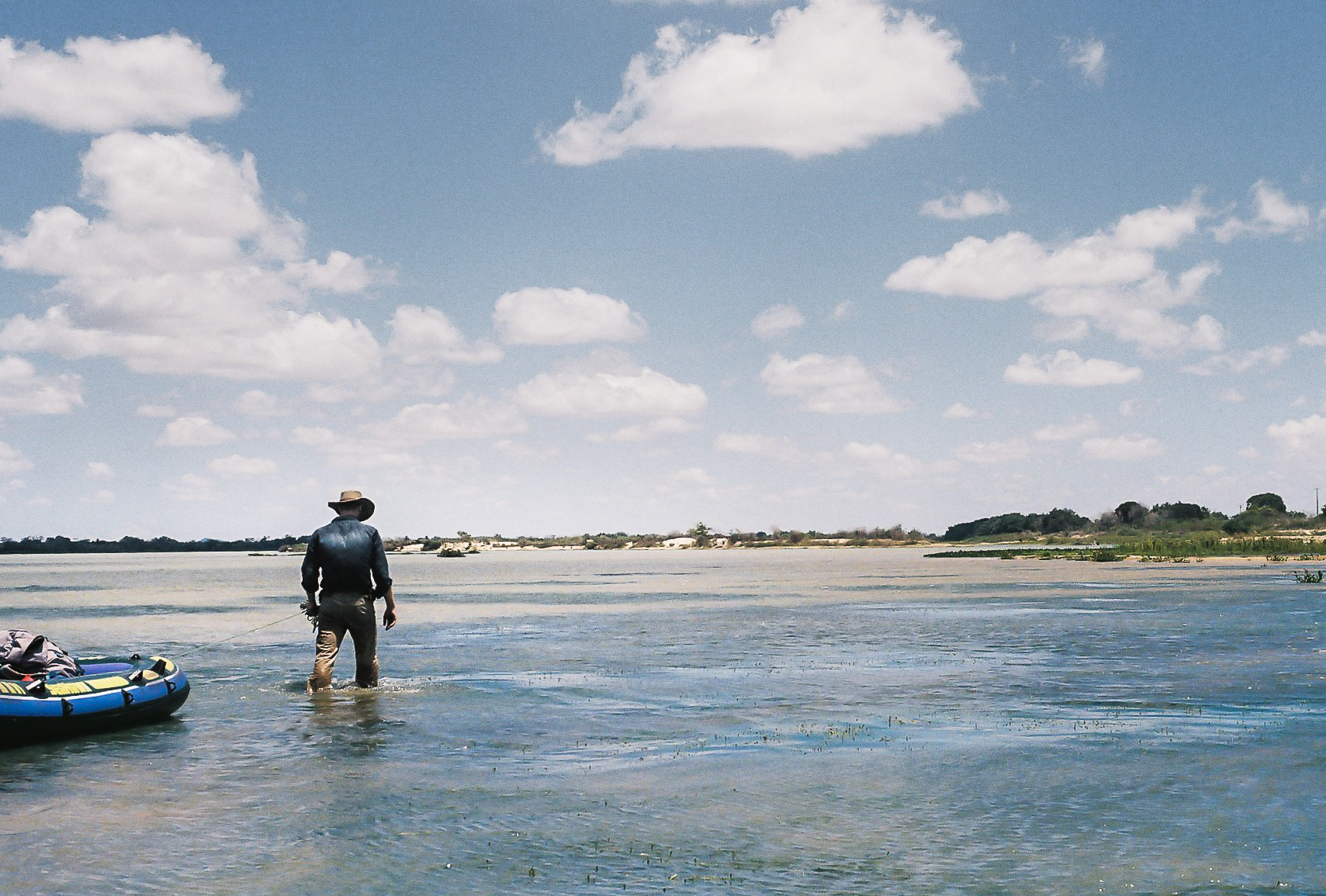
The author pulls his inflatable boat into placid waters. Photo: Courtesy J.R. Patterson.
J.R. Patterson
J.R. Patterson was born in Manitoba in 1989 and raised on a beef and grain farm on the Canadian prairies. His experiences as a farm laborer, factory worker, and musician inform much of his writing.

